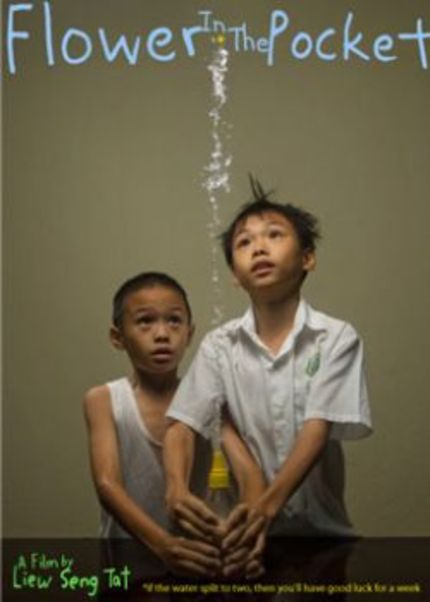FLOWER IN THE POCKET Review

Someone famous once said never to work with animals and children. But Flower In The Pocket has both. And no worries here; director Liew Seng Tat is pretty adept at handling both species.
This double-winner at this year’s Pusan International Film Festival is a strangely beautiful and funny ode to neglected human beings. It’s a sonnet to people who have nothing and yet seek nothing.
It tells the story of two boys, Li Ohm (Wong Zi Jiang) and Li Ah (Lim Ming Wei), who are mostly left on their own by their father Sui (James Lee) who wallows in self-pity due to a failed marriage and distances himself from the rest of the world. This is definitely not a fair situation, as the children, through no fault of their own, ends up also suffering from the fallout effects of the parent’s failings as a spouse.
And Liew’s film is a story of unfairness and parallels. The two boys’ lonely lives are played against their newfound tomboy friend Atan/Ayu (Amira Nasuha)’s happy home life with her doting mother (Mislina Mustafa) and grandmother (played by Yasmin Ahmad’s mother, Mak Inom). While mannequin repairman Sui knowingly flounders in his deadbeat, boring single life and job, his sexed-up newly wed helper all but flaunts his own happy marriage.
The boys’ smiles and carefree romp around town probably mask their deeper uneasiness about their situation, in tandem with how the film’s humorous scenes are a front that soon unravel to reveal a darker second half.
In the midst of it all, Sui has a rather embarrassing medical problem that’s probably more the film’s naughty little joke about having to be both father and mother to the boys, a malady that leads to an extremely hilarious scene at a clinic that just has to be seen to be believed.
Flower In The Pocket is endearing in its many straightfaced comic moments. Anyone who’s familiar with Liew’s short films knows the kind of quirky, oftentimes whimsical humour that he’s capable of. But here, his comedy seems to have found a certain comfortable home somewhere between a more restful Stephen Chow-type of slapstick wackiness and the deadpan humour of Tsai Ming-liang. Sometimes the punchline happens off-screen and it’s the aftermath that provides a delayed but effective tickle, Liew’s very knowing wink at the audience. Even so, Liew never plays these comic scenes as obvious cues but more in a straightforward manner that is not unlike even the dramatic moments, which lends the funnier moments cohesiveness with the rest of the film rather than make them a series of gags.
And that’s probably also why it’s hardly noticeable when, at the halfway point, the comedy ends and the family drama takes over. There’s hardly any dialogue in the second half, but the relationship between the two boys have been so well established that there’s poignancy to the proceedings when unforeseen circumstances force father and sons to re-seriously evaluate their situation. The end note is a beautiful coda that spells hope, forgiveness, reconciliation, and probably a second chance. “Probably,” because as is with all good films, nothing is spelt out, there is no clean resolution. But like he does with everything else in the film, Liew implies and suggests, and clues us in but never provides an easy answer.
But what is clear is that Liew’s camera is never judgemental on any of the characters. Often it’s the drunk and abusive good-for-nothing father in films dealing with neglect, but Liew is even sympathetic towards Sui. A sudden shot of the occupant of a car also gives us an inkling of the possible reason for the boys’ teacher’s disdain towards them.
Upon closer scrutiny, the film would probably yield some insights into racial divides or the lack thereof, or the absence of an authority figure, but as a film alone, it is the most entertaining work to come out of the Malaysian independent cinema. It is also a fitting debut feature that is a perfect introduction to the wildly offbeat world of Liew Seng Tat.







